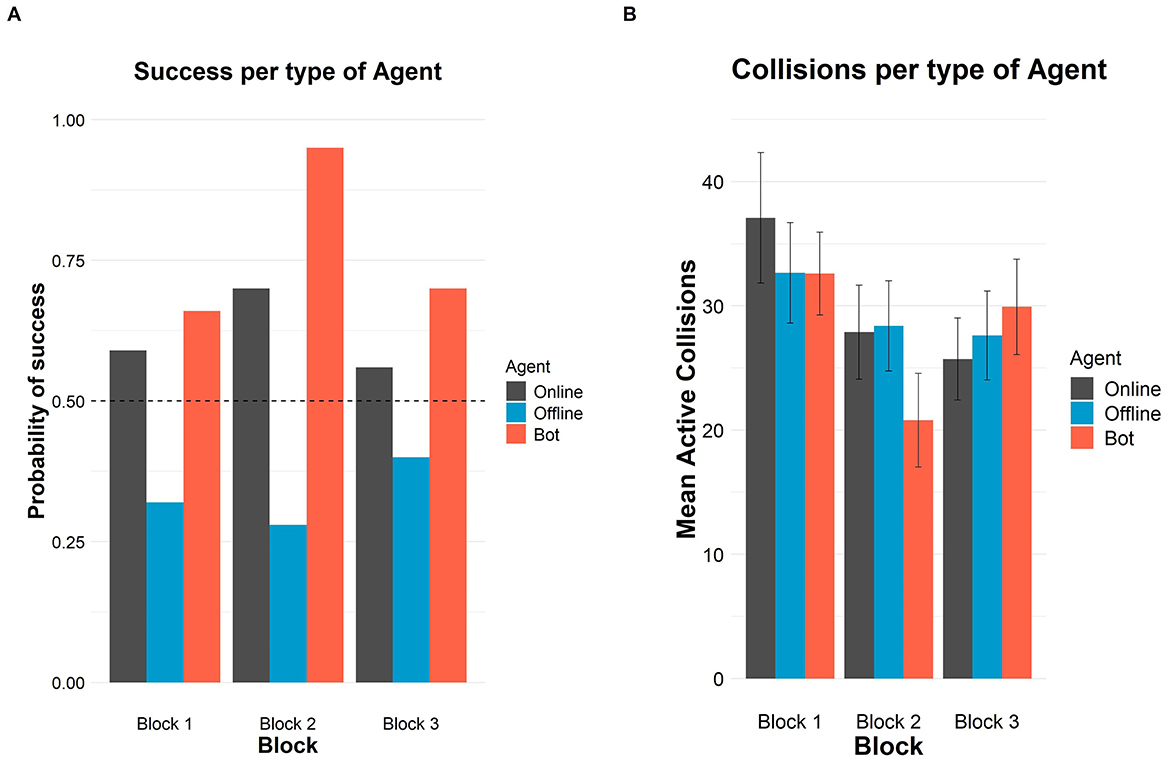
95% of researchers rate our articles as excellent or good
Learn more about the work of our research integrity team to safeguard the quality of each article we publish.
Find out more
CORRECTION article
Front. Hum. Neurosci. , 17 October 2024
Sec. Cognitive Neuroscience
Volume 18 - 2024 | https://doi.org/10.3389/fnhum.2024.1507296
This article is a correction to:
A Minimal Turing Test: Reciprocal Sensorimotor Contingencies for Interaction Detection
A corrigendum on
A minimal Turing test: reciprocal sensorimotor contingencies for interaction detection
by Barone, P., Bedia, M. G., and Gomila, A. (2020). Front. Hum. Neurosci. 14:102. doi: 10.3389/fnhum.2020.00102
In the published article, there was an error in Figure 1 as published. The probability of success for block 3 in the bot condition should be 0.70, as correctly stated in Table 1 and the second paragraph of the Results section. However, in Figure 1, this value is incorrectly shown as 0.95. The corrected Figure 1 and its caption appear below.

Figure 1. Successes and crossings per type of agent and block in Study 1. (A) Probability of success in each block per type of agent. The horizontal dashed line represents chance level (50%). (B) Mean number of crossings in each block per type of agent. Error bars depict 95% confidence intervals.
The authors apologize for this error and state that this does not change the scientific conclusions of the article in any way. The original article has been updated.
All claims expressed in this article are solely those of the authors and do not necessarily represent those of their affiliated organizations, or those of the publisher, the editors and the reviewers. Any product that may be evaluated in this article, or claim that may be made by its manufacturer, is not guaranteed or endorsed by the publisher.
Keywords: Turing test, interaction, sensorimotor contingencies, reciprocity, perceptual crossing
Citation: Barone P, Bedia MG and Gomila A (2024) Corrigendum: A minimal Turing test: reciprocal sensorimotor contingencies for interaction detection. Front. Hum. Neurosci. 18:1507296. doi: 10.3389/fnhum.2024.1507296
Received: 07 October 2024; Accepted: 08 October 2024;
Published: 17 October 2024.
Approved by:
Frontiers Editorial Office, Frontiers Media SA, SwitzerlandCopyright © 2024 Barone, Bedia and Gomila. This is an open-access article distributed under the terms of the Creative Commons Attribution License (CC BY). The use, distribution or reproduction in other forums is permitted, provided the original author(s) and the copyright owner(s) are credited and that the original publication in this journal is cited, in accordance with accepted academic practice. No use, distribution or reproduction is permitted which does not comply with these terms.
*Correspondence: Pamela Barone, cGFtZWxhLmJhcm9uZUB1aWIuZXM=
Disclaimer: All claims expressed in this article are solely those of the authors and do not necessarily represent those of their affiliated organizations, or those of the publisher, the editors and the reviewers. Any product that may be evaluated in this article or claim that may be made by its manufacturer is not guaranteed or endorsed by the publisher.
Research integrity at Frontiers

Learn more about the work of our research integrity team to safeguard the quality of each article we publish.